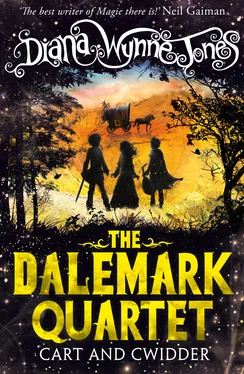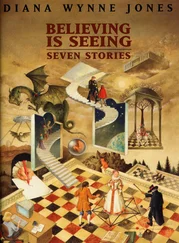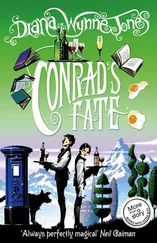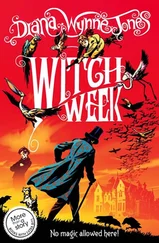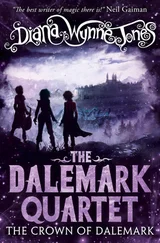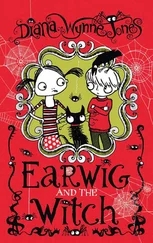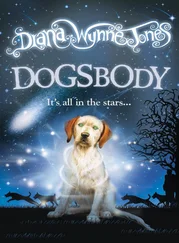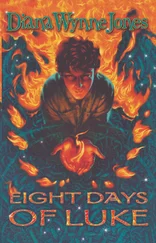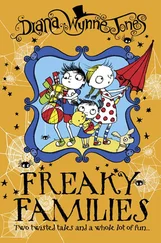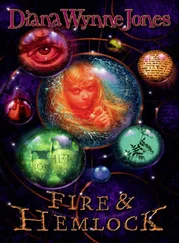“What about payment?” asked Lenina.
“You wait and see,” said Clennen, with a laugh.
“That’s all very well,” said Brid, returning to her discontent. “But why do we always have to take someone? Why can’t the stupid North make friends with the silly South?”
“You tell me,” said Clennen. And after Brid had stammered for a minute, he laughed and said, “Would you make friends with someone you knew would stab you in the back if he got the chance? Remember that. Mind you, there was a time when the South was as free a place as the North. Remember that too.”
This was a bold thing to say in the South. The last rebellion had been stamped out very harshly indeed, and the strict laws were still in force. You did not say anything that suggested you were discontented with the ways of the South. The countryside was known to be full of spies and informers, watching and listening to give warning of rebellious thoughts.
That was why, when Clennen spoke of North, South and freedom in the same breath, Moril saw Lenina look round the hedges to make sure no one was listening. He found himself doing the same.
But the hedges, though the leaves were already dusty, were still thin enough to see through. Nothing moved in them but birds. The only people they saw, for the next mile or so, were in the distance, planting vines on a hillside, until they came to where a road branched off to another vineyard. There, on the triangle made by the turning, a man was waiting. At his feet he had a huge round bottle half encased in a straw basket. He waved, and Dagner drew up. Olob turned his head and looked at the huge bottle with evident misgiving.
“Evening, Flind,” said Clennen. “Is that our payment there, by your feet?” The man nodded. He seemed disinclined to smile, though Clennen smiled broadly at him. “I hoped it was,” said Clennen. “Where’s the passenger?”
Flind jerked a thumb. The passenger, probably in an attempt to keep out of the sun, was sitting behind the bottle in its shadow. He looked very hot, very untidy, rather discontented and rather younger than Dagner.
“Help him into the cart,” Clennen said to Moril.
Moril did his best, but the passenger shook off his helping hand. “I can get in by myself,” he said, “I’m not a cripple.” He climbed in very nimbly and sat on the floor. The canvas cover was half up, and he seemed glad of its shade. Moril looked vaguely after him and hoped it was the heat that made him feel so disagreeable. He knew from bitter experience that someone around Dagner’s age could make life very unpleasant if he was steadily disagreeable for some hundreds of miles. This could be worse than the woman last year. He looked at Brid, who made her squeezed-lemon face back.
Clennen and Flind, meanwhile, were heaving the huge jar through the tailgate of the cart. It took a good deal of effort, and a lot of space once it was in. Olob almost laid his head backwards over his shoulders in an attempt to show his strong disapproval of it.
“Are you really taking our payment in wine?” said Lenina.
“Can you think of a better one?” said Clennen. “My dear girl, there’s only beer to drink in the North! Count your blessings. We’ll broach it this evening, shall we? Or would you rather wait until we’re going through Markind?”
“Oh – this evening,” said Lenina, smiling a little.
Clennen latched the tailgate, waved to Flind, and they went on. Olob made a very expressive business of getting the cart under way again. Brid was quite sorry for him, straining in front of all that extra weight, but everyone else knew that the cart was so well sprung and greased that Olob could hardly feel the difference. Dagner made no bones about flicking him with the whip.
“What a lazy horse!” exclaimed the passenger.
“They’re often the wisest ones,” said Clennen.
The passenger, realising he had been snubbed, put his chin on his knees and sighed gustily. Brid and Moril took turns at eyeing him through the gap in the tailgate. He was burlier than Dagner, though he was younger, and much the same height. But he was more remarkable-looking, because he was a queer combination of dark and fair. His hair was tawny-fair, and there was a lot of it, like a lion’s mane, only rather more untidy, and his eyes were a pale blue-green. But his eyebrows were thick and black and his skin very brown. His nose put them in mind of an eagle. He still had that fed-up look, which they decided must be due to more than the heat.
“Perhaps his grandfather’s dying, and they sent for him, and he doesn’t want to go,” Brid speculated. Moril was content to leave it vague. He simply hoped the passenger would not vent his annoyance on them.
A mile or so further on Clennen said: “We haven’t got your name, lad. There’s a lot in a name, I always think. What is it?”
“It’s Kialan,” said the passenger. “With a K.”
“Even with a K, it’s not half long enough for me,” said Clennen.
“Well, what do you expect me to say? It’s really my name!” the passenger protested.
“I like longer names,” Clennen explained. “Clennen’s too short for me too. Lenina – my wife’s name – is too short. But my children all have good spreading names, because I could choose them myself. The lad driving is Dastgandlen Handagner, my daughter is Cennoreth Manaliabrid, and the one with the red hair is Osfameron Tanamoril.”
Moril ground his teeth and waited for the passenger to laugh. But, in fact, he looked rather awed. “Oh,” he said. “Er, do you call them all that when you want to speak to them?”
“And the lazy-wise horse is Barangarolob,” Clennen added, perfectly seriously, as if he were simply anxious for Kialan to know. Dagner gave a little whinny of laughter, which might have come from Olob. Kialan looked piteous.
“Take no notice,” said Lenina. “They’re Dagner, Brid and Moril for short. And the horse is Olob.”
Kialan looked relieved. He gave another gusty sigh or so and took off his coat. He must have been hot in it, because it was a thick coat, of good cloth. Brid whispered that it must be his best one, but Moril had lost interest in Kialan by then and did not care. Kialan folded the coat – not as carefully as such a good garment deserved – and used it as a pillow while he pretended to go to sleep. Brid knew he was only pretending, because he started up every time any travellers passed them and looked through the opening of the cover to see who they were.
There was not much traffic on the road. Mostly it was slow wagons, which Olob trotted past without any difficulty, sending spurts of white grit from beneath the cartwheels, until Moril, trotting in the rear, seemed to have hair the same colour as Clennen’s. But there were a few horsemen, and these overtook Olob as easily as Olob overtook the wagons. Once, quite a group of riders came past, raising a whirl of white dust, and were scanned by Kialan with great interest. One of the group seemed equally interested in them. He craned round in his saddle as he passed to get a good look at the cart.
“Who was that fellow?” Clennen said to Lenina.
“I couldn’t say,” she answered.
“Funny,” said Clennen, “I seem to have seen him before.” But since the man was a perfectly neutral-looking person, neither dark nor fair and neither young nor old, Clennen could not place him and gave up the attempt.
Shortly after that, as the sun was getting low, Olob left the road of his own accord and jolted the cart among gorse bushes into a heathy meadow. He stopped near a stream.
“Olob thinks this’ll do,” Dagner said to Clennen. “Will it?”
“You don’t really let your horse choose where to stop!” Kialan exclaimed.
“He doesn’t often let us down,” said Clennen, surveying the meadow. “Yes, very nice. Horses have a gift for stopping, Kialan. Remember that.”
Читать дальше
